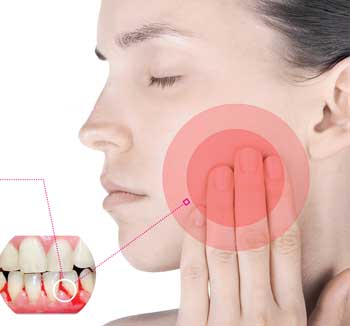13 Oct 2017 - {{hitsCtrl.values.hits}}
Dental Care
 Dental hygiene is one of the most important factors that should be maintained when it comes to personal health. There are a variety of illnesses and diseases that can cause discomfort and lower the quality of life which originate due to bad dental hygiene. One of these problems is gingivitis. Gingivitis is the inflammation of the gum or the gingiva, which gets inflamed due to certain bacteria. Speaking to ‘Health Capsule’ Dr. Vipula Wickramasinghe, General Secretary of the Sri Lanka Dental Association and Regional Dental Surgeon of the Colombo District elaborated on the causes and symptoms of gingivitis and the specified treatment.
Dental hygiene is one of the most important factors that should be maintained when it comes to personal health. There are a variety of illnesses and diseases that can cause discomfort and lower the quality of life which originate due to bad dental hygiene. One of these problems is gingivitis. Gingivitis is the inflammation of the gum or the gingiva, which gets inflamed due to certain bacteria. Speaking to ‘Health Capsule’ Dr. Vipula Wickramasinghe, General Secretary of the Sri Lanka Dental Association and Regional Dental Surgeon of the Colombo District elaborated on the causes and symptoms of gingivitis and the specified treatment.
Causes
Dr. Wickramasinghe stated that there are a variety of causes for gingivitis, the main one being plaque, “Plaque is the food debris which are deposited in the gingival crevice, which is a tiny pocket in between the tooth and the gingiva. The food debris accumulates in this crevice and the bacteria acts  on this and produces a substance called plaque. Its technical name is biofilm. Biofilm consists of bacteria, food debris and saliva. When the plaque accumulates in the gingival crevice because of the bacteria present in the plaque the gingiva gets inflamed,”the doctor said.
on this and produces a substance called plaque. Its technical name is biofilm. Biofilm consists of bacteria, food debris and saliva. When the plaque accumulates in the gingival crevice because of the bacteria present in the plaque the gingiva gets inflamed,”the doctor said.
Risk factors
Speaking of the contributory factors he said, “Firstly if the person is a diabetic patient he or she is more prone to get gingivitis compared to a non-diabetic person, because the inflammation is so severe or frequent. Secondly, there are certain drugs which cause swelling of the gingiva. For example there are certain drugs that are used for high blood pressure or epilepsy. The side effect from these drugs causes the swollen gingiva. The swollen gingiva isn’t as hard as the normal one. It is very soft thus making it more prone to infection. Thirdly, people who are immune compromised- the people who have a defective immunization within the body are more prone to infections and because of that they get gingivitis more than the normal healthy person. Examples for such people are patients having HIV/AIDS or people who are on anti cancerous drugs or people who are on steroids. People who don’t brush their teeth properly, because brushing reduces the plaque. For example the disabled or differently abled people or people with psychiatric disorders. Fourthly, people who are not concerned with their hygiene,”Dr. Wickramasinghe said.
“Another contributory factor is if you are a single side chewer. What occurs is, on the other side there is a tendency of accumulation of plaque, because when you are eating the saliva comes into the mouth and self cleanses the mouth. If you aren’t biting on both sides then the salivary glands on the non-biting side won’t activate as much, thus there will be less saliva on that side. Thus, plaque accumulates and there will be gingivitis on that particular side. Finally, during old age, due to lack of nutrition and certain other conditions, you get the recession of the gums and maybe infection of the gums as well,” he continued.
Symptoms
Dr. Wickramasinghe stated that to identify the symptoms you must first compare it to a normal gum. Identifying the features of an uninfected gum he said, “In the normal gum you get a pink colour gingiva, very well attached to the tooth surface and there is no discolouration in the gum margin and you can have a clear demarcation of the tooth because the tooth is white and the gum is pink.
Moving on to the symptoms he said, “But when gingivitis occurs the gum gets red in colour. It will be a little swollen and there will be bleeding during brushing. There will be spontaneous bleeding as in bleeding without a cause. You can have a bad odour from the mouth. You can see the discolouration or the accumulation of plaque along the gum margin and you can feel the harder stuff on top of that because the plaque absorbs the calcium of the saliva and it gets hardened, which is called calculus or tartar,”he further explained.
Treatment
Dr. Wickramasinghe stated that treatment is divided into 2 parts. One is physical treatment and the other is therapeutic treatment. “I will explain the Physical type of treatments. If you see the symptoms which I mentioned you have to go to a dental surgeon. Then he will advise you on how to brush. The  patient has to understand the reason for the gingivitis and how to get rid of it. We give oral health education/ oral hygiene instruction. That includes the correct method of brushing, the use of a correct brush, use of the correct toothpaste, the correct brushing methods and how frequently you have to brush. Then the patient has to adhere to these instructions and simply by doing so you can reverse the gingivitis, if it is in the initial stage.
patient has to understand the reason for the gingivitis and how to get rid of it. We give oral health education/ oral hygiene instruction. That includes the correct method of brushing, the use of a correct brush, use of the correct toothpaste, the correct brushing methods and how frequently you have to brush. Then the patient has to adhere to these instructions and simply by doing so you can reverse the gingivitis, if it is in the initial stage.
If it isn’t in the initial stage, after following the oral hygiene instructions for at least one to two weeks, the patient may have to undergo a full mouth cleaning. And after that he/she has to follow instructions given by the doctor,”said Dr. Wickremesinghe.
“The therapeutic type of treatment is that there are certain drugs and mouthwashes that are definitely and mandatorily have to be prescribed by the doctor. But the key message is that the therapeutic measures alone won’t help you to get rid of gingivitis. You must have the practice of using the physical mode of treatment as well. And most importantly the doctor has to review the patient to see whether it will recur,” he continued.
He further said, “If you don’t treat it, sometimes it will subside automatically. But Sometimes it will trigger what is called periodontitis which is an extension of gingivitis that involves not only in the gum, but in the periodontal ligaments which connects the tooth and the bones together and the bone itself. Which is why it is better to treat it in the initial stages,”he said.
Prevention
Speaking on how to prevent gingivitis Dr. Wickramasinghe said, “You have to brush twice a day, daily, mandatorily after dinner. Practice the correct brushing method . If you see any point of bleeding go to a doctor immediately for instructions, with practice only you can reverse the disease. And you have to maintain good oral hygiene with good health.”
23 Dec 2024 2 hours ago
23 Dec 2024 3 hours ago
23 Dec 2024 3 hours ago
23 Dec 2024 4 hours ago
23 Dec 2024 5 hours ago